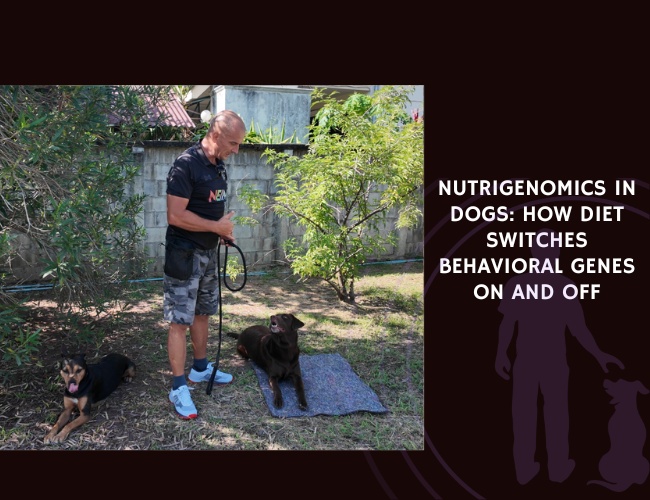Introduction: The Revolutionary Science Behind Your Dog’s Bowl
Did you know that every meal you serve your dog is actually a conversation with their genes? Welcome to the fascinating world of nutrigenomics – where the kibble in your pup’s bowl becomes a powerful switch that can turn behavioral genes on or off, influencing everything from anxiety levels to learning capacity.
For decades, we’ve understood that “you are what you eat,” but science has revealed something far more profound: your dog’s diet doesn’t just fuel their body; it literally reprograms how their genes express themselves. This cutting-edge field called nutrigenomics is revolutionizing how we understand canine behavior, offering hope for anxious rescue dogs, hyperactive puppies, and aging companions struggling with cognitive decline.
Let us guide you through this groundbreaking science that’s transforming how we think about our dogs’ meals. You’ll discover how the choice between raw and processed food impacts far more than digestion, why your puppy’s early diet shapes their adult temperament, and how you can use nutritional strategies to support your furry friend’s emotional wellbeing. 🧠
Understanding Nutritional Epigenetics: When Food Becomes Information
How Nutrients Talk to Your Dog’s DNA
Picture your dog’s genes as a vast library of instructions, and nutrients as the librarians deciding which books get read. This isn’t science fiction – it’s happening right now in your companion’s cells. When specific nutrients enter your dog’s system, they act as molecular messengers, binding to receptors that directly influence which genes become active or dormant.
Key nutrient pathways that influence behavior:
- Tryptophan converts to serotonin, affecting mood and impulse control
- Omega-3 fatty acids regulate inflammatory genes linked to anxiety
- B vitamins (especially B12 and folate) control methylation, the process that turns genes on or off
- Phospholipids correlate with attention and focus capabilities
You might notice your high-energy Border Collie becomes calmer after switching to a diet rich in omega-3s – that’s not coincidence. These fatty acids are literally dampening the expression of pro-inflammatory genes that can heighten stress responses. Similarly, adequate tryptophan levels ensure your dog’s brain has the building blocks for serotonin, that crucial “feel-good” neurotransmitter.
The Epigenetic Symphony: Beyond Simple Genetics
Here’s where things get truly fascinating: epigenetics means your dog’s experiences and diet can influence how their genes work without changing the DNA sequence itself. Think of it like adding sticky notes to that genetic library – these modifications tell cells which instructions to emphasize or ignore.
Recent research on Staffordshire Bull Terriers revealed that dogs fed different diets showed significant variations in blood markers tied to behavior. The heat-processed high-carbohydrate diet group had completely different physiological profiles than those eating non-processed high-fat meals. These weren’t just digestive differences; they represented fundamental changes in how genes were being expressed throughout the body.
What makes this especially powerful is that these epigenetic changes can be reversed or modified. Unlike genetic mutations, which are permanent, epigenetic modifications respond dynamically to dietary interventions. This means that behavioral challenges rooted in gene expression – from aggression to anxiety – might be addressable through targeted nutrition.
The Raw Truth: How Diet Type Transforms Gene Expression
Raw Versus Processed: A Genetic Game-Changer
The debate between raw and processed diets takes on new significance when viewed through the lens of nutrigenomics. Research shows these dietary approaches create distinctly different epigenetic profiles in our canine companions, influencing everything from inflammation markers to neurotransmitter production.
Raw diets (BARF/Prey Model) trigger specific genetic responses:
- Higher red blood cell production genes activate
- Anti-inflammatory pathways strengthen
- Digestive enzyme genes increase expression
- Stress-response genes show reduced activity
Processed kibble diets create different patterns:
- Inflammatory gene markers often elevate
- Blood triglyceride regulation genes work harder
- Certain nutrient absorption genes downregulate
- Oxidative stress pathways may activate more frequently
The implications are profound. Dogs on raw diets often display what owners describe as increased calmness and focus – changes that correlate with measurable shifts in gene expression patterns. Meanwhile, those on highly processed diets may show elevated markers for chronic inflammation, which research links to anxiety and reactive behaviors.
Ultra-Processed Foods: The Epigenetic Disruptor
You’ve probably heard about ultra-processed foods in human nutrition, but their impact on dogs is equally concerning. These industrially manufactured kibbles, loaded with additives and subjected to extreme heat processing, can destabilize your dog’s epigenetic landscape in troubling ways.
Studies reveal that puppies fed ultra-processed carbohydrate-heavy diets during their critical developmental window (2-6 months) face significantly higher risks of chronic enteropathy later in life. But the effects extend beyond digestion – these early dietary experiences create lasting epigenetic imprints that influence behavior, stress resilience, and cognitive function throughout adulthood.
The mechanisms are multifaceted. Ultra-processed foods often trigger pro-inflammatory gene cascades while simultaneously disrupting the delicate balance of the gut microbiome. This double impact creates what researchers call “epigenetic instability” – a state where gene expression becomes erratic and unpredictable, potentially manifesting as behavioral inconsistencies, mood swings, or learning difficulties. 🐾
The Gut-Brain-Gene Connection: Your Dog’s Second Brain
Microbiome: The Master Conductor of Gene Expression
Inside your dog’s gut lives a bustling metropolis of bacteria – trillions of microorganisms that do far more than aid digestion. This microbiome acts as a sophisticated communication network, sending signals that influence gene expression not just in the intestines, but throughout the body and crucially, in the brain.
The gut microbiota produces metabolites that can cross the blood-brain barrier and directly impact neurological function. Short-chain fatty acids, produced when beneficial bacteria ferment dietary fiber, activate genes involved in reducing inflammation and promoting neural plasticity. Meanwhile, harmful bacteria can produce toxins that trigger stress-response genes and inflammatory pathways.
How the microbiome influences behavioral genes:
- Beneficial bacteria promote GABA production, calming anxiety-related genes
- Diverse microbiomes correlate with improved cognitive gene expression
- Dysbiosis (microbial imbalance) activates stress and aggression pathways
- Specific bacterial strains influence serotonin and dopamine gene regulation
Working dogs with optimal microbiome profiles show enhanced motivation, better sociability, and improved trainability – traits directly linked to favorable gene expression patterns. This isn’t just correlation; research demonstrates that transplanting microbiomes between animals can transfer behavioral characteristics, proving the causal relationship.
Probiotics and Prebiotics: Genetic Modulators
Understanding the microbiome’s role in gene regulation opens exciting possibilities for behavioral interventions through targeted supplementation. Probiotics and prebiotics don’t just improve digestion – they actively reshape the epigenetic landscape of your dog’s nervous system.
Evidence-based probiotic benefits for gene expression:
- Bacillus coagulans enhances nutrient absorption genes
- Lactobacillus strains reduce inflammatory gene markers
- Bifidobacterium species support cognitive function genes
- Multi-strain formulas create synergistic epigenetic effects
Prebiotics work differently, feeding beneficial bacteria already present in your dog’s gut. Ingredients like chicory root, Jerusalem artichoke, and specific fibers selectively nourish bacteria that produce anti-inflammatory metabolites. These metabolites then influence gene expression throughout the body, creating a cascade of positive effects on behavior and cognition.
The timing and consistency of probiotic supplementation matter enormously. Research shows that continuous supplementation for at least 6-8 weeks is needed to establish stable epigenetic changes. Sporadic use might improve temporary symptoms but won’t create the lasting genetic reprogramming that leads to sustained behavioral improvements. 😄

Maternal Programming: How Mom’s Diet Shapes Puppy Personalities
The Pregnancy Diet Blueprint
What a pregnant dog eats doesn’t just nourish growing puppies – it programs their genetic expression for life. This phenomenon, called maternal epigenetic imprinting, means that mom’s nutritional choices during pregnancy create lasting marks on her puppies’ DNA that influence temperament, stress resilience, and learning capacity.
Research reveals that maternal gut microbiome health directly impacts cognitive development in offspring. When pregnant dogs consume diets rich in diverse, whole foods, their puppies show enhanced neural development markers and more balanced stress-response genes. Conversely, mothers fed ultra-processed diets often produce puppies with heightened anxiety markers and reduced cognitive flexibility genes.
The mechanisms are remarkably sophisticated. Nutrients from the mother’s diet influence DNA methylation patterns in developing puppy brains, particularly in regions controlling emotional regulation and learning. These methylation marks act like volume controls on genes – some turned up, others turned down – creating a unique behavioral blueprint for each puppy.
Transgenerational Effects: Beyond One Generation
Here’s where nutrigenomics becomes truly mind-blowing: dietary choices can echo through multiple generations. Studies in mammals demonstrate that nutritional stress or abundance experienced by grandparent dogs can influence behavioral traits in grandpuppies who never experienced those conditions directly.
How transgenerational inheritance works:
- Epigenetic marks on sperm and egg cells pass to offspring
- These marks influence early embryonic development
- Brain development patterns reflect ancestral nutritional experiences
- Behavioral tendencies emerge based on inherited epigenetic profiles
This means that breeding dogs fed optimal diets aren’t just healthier themselves – they’re creating epigenetic advantages that benefit multiple generations of puppies. Conversely, nutritional deficiencies or toxic exposures can create vulnerabilities that persist even when subsequent generations receive excellent nutrition.
For breeders, this science revolutionizes best practices. Starting nutritional optimization months before breeding, maintaining it through pregnancy and lactation, and continuing through puppy development creates compounding epigenetic benefits. You’re not just feeding dogs; you’re programming the genetic potential of future generations. 🧡
Practical Applications: Nutrigenomics in Action
Tailoring Diets for Behavioral Challenges
Now that we understand how diet influences gene expression, let’s explore practical applications for common behavioral issues. The beauty of nutrigenomics is that it offers targeted, science-based nutritional strategies for specific behavioral challenges.
For Anxiety and Fearfulness:
- Increase omega-3 fatty acids (EPA/DHA) to downregulate inflammatory genes
- Add L-theanine-rich foods to promote GABA gene expression
- Include magnesium to support stress-resilience genes
- Incorporate adaptogenic herbs that modulate cortisol-response genes
For Hyperactivity and Impulsivity:
- Balance protein levels to optimize dopamine gene regulation
- Reduce simple carbohydrates that spike inflammatory markers
- Add B-complex vitamins to support methylation processes
- Include phospholipid-rich foods (eggs, fish) for attention-related genes
For Aggression and Reactivity:
- Ensure adequate tryptophan for serotonin synthesis genes
- Minimize pro-inflammatory ingredients (corn, wheat, soy)
- Add probiotic strains linked to reduced aggression markers
- Consider elimination diets to identify trigger foods
The key is consistency and patience. Epigenetic changes don’t happen overnight – most dogs need 8-12 weeks on a modified diet before significant behavioral shifts become apparent. During this time, genes are gradually being reprogrammed, inflammatory markers are decreasing, and new neural pathways are forming.
Genetic. Nutritional. Transformative.
Food rewrites behaviour. Nutrigenomics shows each meal influences gene expression, shaping mood, focus, and resilience through molecular nutrition.
Nutrients act as signals. Tryptophan, omega-3s, and B vitamins guide serotonin levels, inflammation control, and methylation, switching key behavioural genes on or off.



Diet becomes destiny. Early choices and consistent strategies can ease anxiety, sharpen cognition, and support emotional wellbeing across a dog’s lifetime.
Enhancing Cognitive Performance Through Nutrition
Whether you’re training a service dog or helping your senior companion maintain mental sharpness, nutrigenomics offers powerful tools for cognitive enhancement. By targeting genes involved in neuroplasticity, memory formation, and learning, specific dietary interventions can measurably improve cognitive performance.
Brain-boosting nutritional strategies:
- Medium-chain triglycerides (MCT oil) activate genes for alternative brain fuel
- Antioxidant-rich foods protect neural genes from oxidative damage
- DHA supplementation enhances synaptic plasticity genes
- Phosphatidylserine supports memory consolidation genes
Working and sport dogs benefit particularly from nutrigenomic optimization. Research on military and police dogs shows that those receiving targeted nutritional support display superior problem-solving abilities, faster learning curves, and better performance under stress. These improvements correlate directly with favorable changes in gene expression profiles related to cognitive function.
For aging dogs, nutrigenomics offers hope for maintaining cognitive function. Specific nutritional interventions can slow or even reverse age-related changes in gene expression, potentially delaying or preventing canine cognitive dysfunction. The earlier these interventions begin, the more effective they tend to be.
Building a Preventive Nutrition Strategy
The most powerful application of nutrigenomics might be prevention – using nutrition to optimize gene expression before problems arise. This proactive approach can help dogs maintain behavioral balance throughout their lives.
Core principles of preventive nutrigenomics:
- Start early: Puppy nutrition shapes lifelong gene expression patterns
- Prioritize variety: Diverse nutrients prevent epigenetic rigidity
- Minimize processing: Whole foods preserve beneficial compounds
- Support the microbiome: Feed the genes through gut bacteria
- Monitor and adjust: Individual responses vary based on genetics
Creating a preventive nutrition plan starts with understanding your dog’s baseline. Consider their breed tendencies, family history, and current behavioral patterns. Then, build a diet that addresses potential vulnerabilities while strengthening genetic advantages.
Remember that preventive nutrition isn’t about perfection – it’s about consistency. Regular exposure to beneficial nutrients creates stable, positive gene expression patterns that support behavioral health. Even small improvements, maintained over time, can yield significant epigenetic benefits.
Special Considerations: Breed-Specific Nutrigenomics
Working Breeds: Optimizing Performance Genes
Different breeds carry unique genetic profiles that respond distinctively to nutritional inputs. Working breeds like German Shepherds, Belgian Malinois, and Border Collies have genetic variants that influence how they process nutrients and how those nutrients affect behavior-related gene expression.
Breed-specific considerations for working dogs:
- Higher protein requirements to support muscle and neurotransmitter genes
- Enhanced need for B vitamins due to increased methylation demands
- Greater sensitivity to inflammatory foods affecting focus genes
- Increased antioxidant needs from higher metabolic rates
These breeds often benefit from nutrient timing strategies. Providing specific nutrients before training sessions can temporarily upregulate genes involved in learning and memory. Post-training nutrition can support recovery genes and consolidate learning at the molecular level.
Research shows that herding breeds respond particularly well to choline supplementation, which supports genes involved in sustained attention and impulse control. Meanwhile, guardian breeds may benefit more from tryptophan optimization to balance protective instincts with appropriate calmness.
Sensitive Breeds: Managing Reactive Genes
Some breeds, including many terriers, toy breeds, and certain herding dogs, carry genetic variants that make them more reactive to environmental stimuli. Nutrigenomics can help modulate these sensitivity genes, creating calmer, more balanced temperaments.
For these sensitive souls, the wrong diet can trigger a cascade of unfavorable gene expression. High-glycemic foods might cause blood sugar spikes that activate stress-response genes. Food additives could trigger inflammatory pathways that heighten reactivity. Even seemingly minor nutritional imbalances can have outsized effects on behavior.
The solution involves careful attention to diet composition and quality. These dogs often thrive on limited-ingredient diets that minimize potential triggers while ensuring optimal nutrition. Gradual transitions between foods help prevent epigenetic stress responses that could worsen reactivity.
The Senior Years: Nutrigenomics for Aging Dogs
Cognitive Decline: A Reversible Process?
Age-related cognitive decline in dogs isn’t inevitable – it’s largely driven by changes in gene expression that nutrition can influence. As dogs age, certain genes involved in neural protection and repair become less active, while inflammatory genes may increase their expression. Targeted nutrition can help reverse these patterns.
Key nutritional interventions for senior cognitive health:
- Curcumin to reduce neuroinflammatory gene expression
- Resveratrol to activate longevity and neuroprotection genes
- Omega-3s to support synaptic maintenance genes
- SAMe to enhance methylation and mood-regulating genes
Studies show that senior dogs receiving comprehensive nutritional support can actually improve their cognitive test scores, demonstrating that age-related genetic changes aren’t fixed. The brain remains remarkably plastic throughout life, capable of positive adaptation when given the right nutritional tools.
The timing of intervention matters. Starting cognitive support nutrition in middle age (around 7 years for most breeds) provides the best outcomes. However, even dogs showing signs of cognitive dysfunction can benefit from nutrigenomic interventions, often showing improved awareness, recognition, and daily functioning.
Supporting Emotional Resilience in Senior Dogs
Aging can bring increased anxiety, confusion, and changes in sleep patterns – all linked to shifting gene expression patterns. Nutrigenomics offers gentle, effective ways to support emotional wellbeing in senior dogs without relying solely on medications.
Evening primrose oil, rich in gamma-linolenic acid, can help regulate genes involved in mood stability. Adaptogenic herbs like ashwagandha may help modulate stress-response genes that become dysregulated with age. These natural interventions work by restoring youthful gene expression patterns rather than simply masking symptoms.
Creating a senior-specific nutrigenomic protocol involves layering supportive nutrients. Start with a high-quality base diet, add targeted supplements for cognitive support, include probiotics for gut-brain health, and consider therapeutic foods for specific concerns. This comprehensive approach addresses multiple genetic pathways simultaneously. 🐾
Common Mistakes and Misconceptions
The “One Size Fits All” Fallacy
Perhaps the biggest mistake in canine nutrition is assuming all dogs need the same diet. Nutrigenomics reveals that genetic variations between individuals – even within the same breed – create different nutritional needs and responses. What optimizes gene expression in one dog might be inadequate or even problematic for another.
Signs your dog’s diet isn’t supporting optimal gene expression include persistent behavioral issues despite training, chronic low-grade health problems, inconsistent energy levels, and poor stress recovery. These symptoms often indicate that current nutrition isn’t properly regulating gene activity.
The solution involves careful observation and sometimes testing. Nutrigenomic testing for dogs is becoming increasingly available, offering insights into how your specific dog’s genes might respond to different nutrients. Even without testing, systematic dietary trials can reveal which nutritional approaches best support your dog’s unique genetic expression.
Quick Fix Expectations
Another common misconception is expecting immediate results from dietary changes. While some effects appear quickly (improved energy from better blood sugar regulation), true epigenetic reprogramming takes time. Gene expression patterns built over months or years don’t shift overnight.
Most behavioral changes from nutrigenomic interventions follow a predictable timeline. Week 1-2 might show subtle changes in energy or digestion. Weeks 3-6 often bring noticeable shifts in reactivity or focus. By weeks 8-12, more stable behavioral changes typically emerge as new gene expression patterns consolidate.
Patience during this transition is crucial. Switching diets too quickly or frequently can actually create epigenetic stress, potentially worsening behavioral issues. Commit to at least a 12-week trial before evaluating the full impact of nutritional changes.
Implementing Nutrigenomic Principles: Your Action Plan
Starting Your Dog’s Nutrigenomic Journey
Ready to harness the power of nutrigenomics for your furry friend? Let’s create a practical roadmap for optimizing your dog’s gene expression through nutrition. This isn’t about perfection – it’s about progress and finding what works for your unique companion.
Week 1-2: Baseline Assessment
- Document current behavioral patterns and concerns
- Note energy levels throughout the day
- Track any digestive issues or food sensitivities
- Photograph your dog’s coat condition and body composition
Week 3-4: Gradual Transition
- Slowly introduce higher-quality proteins
- Add omega-3 supplementation
- Incorporate probiotic-rich foods or supplements
- Reduce ultra-processed ingredients
Week 5-8: Optimization Phase
- Fine-tune protein-to-fat ratios based on response
- Add targeted supplements for specific concerns
- Introduce variety in whole food ingredients
- Monitor and document changes
Week 9-12: Evaluation and Adjustment
- Compare current state to baseline documentation
- Identify successful interventions
- Adjust portions or supplements as needed
- Establish long-term maintenance plan
Working with Your Veterinarian
While nutrigenomics offers powerful tools, partnership with a knowledgeable veterinarian enhances success. Not all vets are familiar with nutrigenomic principles, but many are increasingly interested in this integrative approach to behavioral health.
When discussing nutrigenomics with your vet, focus on specific, measurable outcomes you’re seeking. Rather than talking about “gene expression,” discuss concrete goals like reducing anxiety, improving trainability, or supporting cognitive function. Most vets respond well to evidence-based approaches backed by research.
Bring documentation of dietary changes and observed responses. This data helps your vet understand what’s working and can guide medical interventions if needed. Remember, nutrigenomics complements rather than replaces veterinary care – the two work synergistically for optimal results.
The Future of Canine Nutrigenomics
Emerging Research and Possibilities
The field of canine nutrigenomics is advancing rapidly, with new discoveries constantly expanding our understanding. Researchers are identifying specific genetic markers that predict dietary responses, developing targeted nutritional interventions for breed-specific behavioral challenges, and exploring how environmental factors interact with diet to influence gene expression.
Personalized nutrition plans based on genetic testing are becoming increasingly sophisticated. Soon, a simple cheek swab might reveal exactly which nutrients your dog needs for optimal behavioral health, which foods might trigger adverse reactions, and how to prevent age-related cognitive decline through targeted nutrition.
The integration of artificial intelligence with nutrigenomic data promises even more precise interventions. Machine learning algorithms can analyze vast datasets to identify patterns humans might miss, potentially revolutionizing how we approach canine behavioral nutrition.
The One Health Perspective
Nutrigenomics reminds us that health is interconnected – what affects our dogs often parallels human health discoveries. The One Health approach recognizes these connections, using insights from canine nutrigenomics to inform human nutrition and vice versa.
This perspective extends beyond individual health to environmental considerations. The foods we choose for our dogs impact agricultural practices, environmental sustainability, and even wildlife populations. Nutrigenomics can guide us toward dietary choices that benefit not just our pets’ genes but the broader ecosystem.
As we deepen our understanding of how nutrition influences gene expression, we’re discovering that optimal health – behavioral, physical, and emotional – emerges from honoring the complex relationships between diet, genes, microbiome, and environment. This holistic view transforms how we think about feeding our beloved companions.
Conclusion: Your Dog’s Genetic Potential Awaits
We’ve journeyed through the fascinating world of nutrigenomics, discovering how every meal becomes a conversation with your dog’s genes. From the profound impacts of raw versus processed diets to the transgenerational effects of maternal nutrition, you now understand that your dog’s bowl holds more power than you might have imagined.
The science is clear: nutrition doesn’t just fuel your dog’s body – it actively shapes their behavioral destiny through gene expression. Whether you’re addressing anxiety in a rescue dog, optimizing performance in a working companion, or supporting cognitive health in a senior friend, nutrigenomics offers evidence-based tools for transformation.
But perhaps the most empowering aspect of nutrigenomics is that it puts you in control. Unlike fixed genetic traits, gene expression responds dynamically to nutritional interventions. This means that behavioral challenges once thought permanent might be modifiable through strategic dietary choices. Your dog’s genetic potential isn’t fixed – it’s waiting to be optimized.
As you implement these nutrigenomic principles, remember that every dog is unique. What works brilliantly for one might need adjustment for another. Stay curious, observe carefully, and celebrate small improvements. The journey toward optimal gene expression is gradual but profound.
The future of canine health lies not in treating symptoms but in optimizing the very expression of life itself. Through the lens of nutrigenomics, we see that love isn’t just about the time we spend with our dogs – it’s about the thoughtful nutrition we provide, knowing that each meal shapes their genes, their behavior, and ultimately, their quality of life.
Your dog’s genes are listening. What will you tell them today? 🧡










